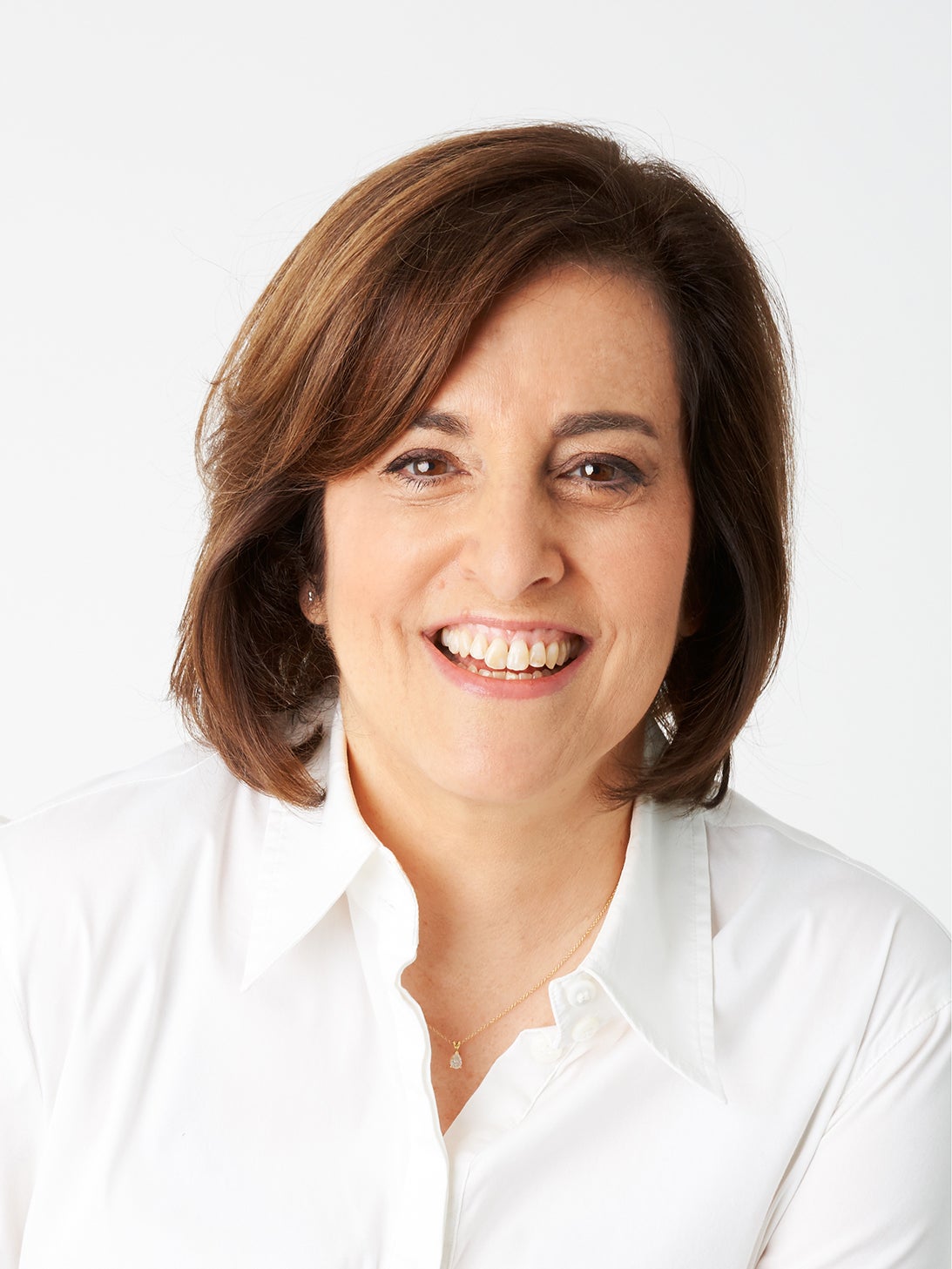
Rena Hozore Reiss
GENERAL COUNSEL,
MARRIOTT
BETHESDA, MD
Outside Rena Reiss’ office at Marriott International hangs a sign: “Be kind.” Arne Sorenson, Marriott’s president and CEO (and a former lawyer), walked by and jokingly asked if that sign belonged in the legal department. Reiss replied that being kind isn’t the same as being a pushover. It was an intentional move on her part — as are most of her decisions. A believer in design thinking, a methodology designed around empathy, she is focused on the issues that either bother or motivate people. In order to lead the legal department effectively, she needs her team to be comfortable sharing their concerns, thoughts, and ideas with her.
Marriott belongs to an ancient industry: hospitality. But the industry in recent years has been disrupted by start-up companies. Now, Marriott itself is becoming a disruptor by entering the home rental market.
Reiss was part of the executive team that weighed this decision. Anybody who has followed the industry knows that every jurisdiction has a different take on regulation. Reiss’ role wasn’t to opine on the legality in certain markets — it was to help evaluate the risks of a move into a new line of business. How would such a move affect the company’s reputation? How would hotel owners react?
“My role is to help identify those issues, find people who can run them to ground, and then figure out how we [confront] challenges that we might have, to clear a path and formulate the business of the company going forward,” Reiss summarizes.
Marriott piloted a home rental program in Europe in 2018 and recently announced a new, global offering. Launched in May 2019, Homes & Villas by Marriott International offers 2,000 premium and luxury homes located in over 100 destinations throughout the United States, Europe, the Caribbean, and Latin America.
Getting to know … Rena Hozore Reiss
WHAT DOES YOUR TYPICAL WEEKEND LOOK LIKE?
First and foremost, I like to spend time with my husband, whom I don’t see that much during the week. We have two grown kids who don’t live in DC at the moment, so if we’re really lucky we get to see them on a weekend. They’ll come in, or we’ll go visit them. I do have a lot of other family in the area, and we’re really fortunate to have a great community of friends because we’ve been in the DC area for quite some time. And if a great meal is attached to those visits, even better. You can put me down in front of most movies, and I’ll be happy. Theater, arts in general, I love to take advantage of that. One of the great perks of living in DC is lots of free museums where you can just go and spend an hour. I’m fond of saying I don’t like the gym, but I try to get there on the weekends. And then there’s usually some catch-up on work. Almost always can’t avoid that.
WHAT’S YOUR FAVORITE MARRIOTT PROPERTY, AND WHY DO YOU LIKE IT? AND WHERE WOULD YOU RECOMMEND OUR READERS VISIT?
So, the commercial endorsement I’ll give you is you should pick wherever you want to go, and you’ll likely find one of our properties there. But we’re all fond of saying we never say that we love one of our children better than the others. I think for the most part I’m either a beach person or a big city person, so if you give me a great property in a city, that’s a great weekend and a great visit for me. Likewise, if you give me a beach property pretty much anywhere, I’m going to be quite content to be there.
The GC role
Reiss thought she knew a lot about the hospitality industry after spending 10 years — 2000 to 2010 — working for Marriott, eventually leading the legal team that supported managed hotel development in North and South America. Then she accepted a position as general counsel for rival Hyatt. She quickly learned to “get out of my swim lane” — that is, to think more broadly than “just” a lawyer — to interface with the business. This expanding aspect of the GC role is one of the things she likes most about the way the GC role has evolved over the past few years, she says. At Hyatt, which is headquartered in Chicago, Reiss worked closely with the board of directors as corporate secretary. She saw the differences between how management and the board approach business challenges. “You learn a great deal about how to become better as a legal advisor to the company when you see how the board members are looking at particular risks, which is where the GC’s role comes in in a big way,” she explains. Those risks go to the core of the business, like articulating the company’s purpose, its fundamental priorities and values, and whether, and how, it should enter new areas of business.
After seven years at Hyatt, Reiss rejoined Marriott as general counsel in 2017. The company had gone through changes in the interim; not only was Sorenson CEO, taking over from Mr. Marriott (who remains executive chairman and chairman of the board), but the company had grown substantially, and her colleagues’ elementary-age children were now in high school and applying to college. “It was familiar but also wonderfully new, and it was just really exciting,” Reiss remembers.
Being elevated to a leadership role after working among peers is one of the trickier transitions a professional ever makes. In a way, moving to Hyatt helped Reiss with the transition because she had a seven-year hiatus during which she learned the GC role. But she emphasizes that it’s paramount to respect the team’s increased knowledge and experience gained over the course of time and listen and learn from them.
Both Marriott, the law department, and the hospitality industry itself changed during her time away from Marriott. The industry has seen a great deal of consolidation and global expansion, including the growth of online booking agencies and platform companies. Marriott, for example, has 30 brands that cater to every type of traveler, and members of the new Marriott Bonvoy travel program can redeem loyalty points across any participating hotels in the portfolio.
The other aspect of the GC role that cannot be overstated is the responsibility to make the tough decision. In order to steer the department, and ultimately the company, in the right direction, a GC needs to be comfortable making decisions with imperfect or incomplete information and under time constraints. While outside counsel often articulates the myriad risks of a business proposal, in-house counsel must collaborate with the business to determine which risks are unlikely, which ones may need creative solutions, and which ones pose real problems. “I try to be as absolutely transparent with my team as I can because I think it makes us all better decisionmakers,” Reiss advises. One of the best pieces of advice she’s ever gotten is to make a decision and move on. If there’s a problem, deal with it.
The transparency is key because coworkers are often reluctant to elevate issues to leadership, she says. The only way Reiss can solve problems is if she knows about them. To ensure that she gives colleagues (and the issues they wish to discuss) the time they deserve, she encourages calendar meetings when the topic merits more than an impromptu quick chat. What may be perceived as a formality is really a sign of respect, she clarifies, to make sure that she can give her team the time and attention they deserve. She spent several months holding one-on-ones with her attorneys. Sitting down with people helps determine motivating factors. “You learn a lot about both the person and the things that could make me a better leader,” she says.
When Marriott uncovered unauthorized access to a Starwood guest reservations database, her team pulled together and collaborated constantly, which meant frequent legal team calls. Those calls often started with a moment of levity, usually something funny from home or the news. Keeping a sense of humor under pressure is a way to keep priorities straight, Reiss says. She elaborates: “I think a fraught situation is when Marriott’s ‘take care’ motto applies in a very real sense. We have to take care of each other, we have to take care of ourselves, and we have to take care of our families — even if we feel like we’re being pulled in many different directions.”
Emboldened curiosity
Reiss grew up in the Jamaica Estates section of Queens in New York City. Her dad installed a basketball hoop at her childhood home. A neighbor, perplexed why he would install a basketball hoop without any boys in the house, asked about it. His matter-of-fact answer that his daughters could play basketball as well as any boy encouraged Reiss and her sister to set their goals high. “We weren’t going to be limited by anyone’s preconception of who we were,” she remembers. “The broader lesson was we felt like our parents were going to stand behind us and help us do whatever we wanted to do.”
Her father, a trusts and estates lawyer, passed away when she was in high school. It wasn’t until after his passing that Reiss really thought about her dad as a professional. She recalls that he always had a yellow legal pad nearby full of his indecipherable handwriting.
Her mother, who had worked for anti-poverty programs while Reiss and her sister were growing up, decided to pursue her dream of going to law school, even though the family circumstances had changed. As her mother pursued her legal degree, Reiss would often tag along and sit in on her mom’s law school classes. She notes that it’s a family tradition now: Her daughter earned her JD two years ago.
She also credits her Jewish upbringing as a precursor to becoming a lawyer. She went to a Jewish day school and studied the Talmud, the primary source of Jewish religious law and theology. The Talmud is famous for intricate arguments about nearly everything. Reiss says studying it gave her an ability to construct arguments and look at an issue from different points of view.
Reiss majored in history at Princeton, where she wrote her senior thesis about US refugee policy between 1938 and 1953. She was able to dig into the subject, including venturing to Washington, DC to search the National Archives and access State Department memos. Reiss would find not only the official memo but what was handwritten in the margins. The topic has a remarkable application in today’s world, she notes. “It’s amazing how the politics of a country at a certain point in time are reflected in its immigration policy,” she says.
She was also enthralled by history courses addressing the way cultures influence and are reflected in each other. For example, Mardi Gras celebrations have much in common with the Jewish holiday of Purim, and both are rooted in pagan customs. Reiss admits she “doesn’t know if that stuff is useful for a career, but it sure is an interesting course of study.”
Early in-house lessons
Reiss’ first in-house job was in the legal department of the Miami Herald Publishing Company, a subsidiary of American media company Knight Ridder, where she discovered the difference between avoiding risk and mitigating risk. She recalls the general counsel advising her that the only way to completely avoid risk would be to publish a blank newspaper.
It’s an indelible lesson that applies equally to the hospitality industry. “If we wanted to play it safe, we’d send everyone home, lock the doors to our hotels, and take the keys,” she says. Every business must accept a degree of risk, and it is up to the legal department to help determine the acceptable level.
The allure of in-house work is the satisfaction of seeing your work bear fruit, Reiss maintains. Compared with working for a law firm, when you’re often asked to parachute in to help with one aspect of the deal and dismissed after your contribution, in-house work provides a complete vision of a deal, from start to finish. Her office is infamously messy — colleagues comment on the stacks of paper regularly. But the paperwork pays off. She recalls working on the JW Marriott and The Ritz-Carlton Grande Lakes dual-branded property in Orlando, FL. In that instance, the stack of closing documents translated into a world-class resort. But when you live with a transaction through its lifecycle, you also have to deal with the fallout if mistakes are made during the process, Reiss notes, adding that most inhouse lawyers are fine with the tradeoff.
As she progressed in her career, she also raised a family as a working mom. She frames it as a working parent juggle because it is a “people” issue and not only a women’s issue, she contends. And she openly talks with her team members who are facing the same conundrums. Leaders have an obligation to offer opportunities to people, and the onus is on leadership to continue to provide those opportunities when other priorities, such as a child, alter a parent’s career path. And the only way that can happen is if there is truly open communication between leaders and those they lead. That starts with a lesson Reiss affirms every day: Be kind.




